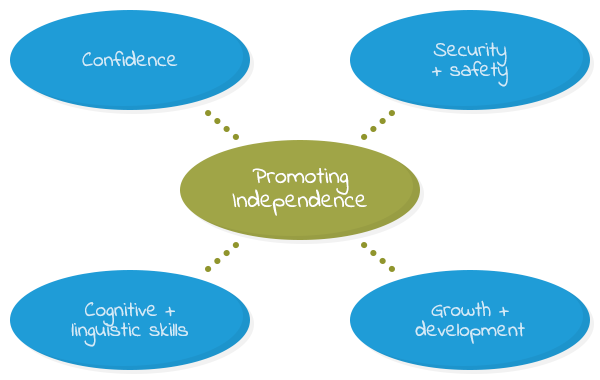Routines, development and independence
Assessment
In your Assessment at the end of this Unit, you will be asked to:
- Describe everyday activities, which promote independence.
This will help you to satisfy assessment criterion 4.1 for this Unit. You’ll find lots of information over the following pages to help you complete this part of your Assessment.
As you have learnt, routines provide predictable patterns of behaviour throughout the day for children of all ages. Routines are particularly important for children as they help them to feel secure, and gain a sense of independence.
Click on the mind-map below to learn more about how routines promote independence.
Security and safety
Routines make sure that children’s needs are met, allowing them to feel secure and safe. For example, having designated times for certain games may help children to feel more confident about social situations, as they will know that they are going to play a certain game at a certain time. This security can give children the confidence to do things for themselves, like playing with others and exploring new activities. This in turn helps children to make new friends and play new games, and become more socially independent.
Growth and development
Routines promote a child’s physical development, as they can ensure that children have all of the nutrients and energy that they need to develop and grow. For example, having designated times for meals and snacks means that it’s very easy for children to get all of the nutrients they need. This means that they are more able to do new things, such as become strong enough to crawl, walk and run! Routines play a vital role in children becoming more physically independent.
Cognitive and linguistic skills
As already mentioned, routines help children to receive all of the nutrients that they need. This means that they gain everything they need for their brains to grow, and for them to learn and remember new information. For example, regularly incorporating fruit and vegetables into a child’s diet helps to support brain growth and function. This helps with everything from learning to speak to being able to do maths! Routines therefore play an important role in children becoming more independent in their communication skills, a vital part of being an adult.
Confidence
The more that children are able to do things for themselves, such as using a knife and fork or the toilet, the more confident they become. As children become more confident, they seek out more activities for themselves, and are less reliant on adults. Providing lots of positive feedback and praise when children are learning new skills is a great way to build their confidence.
Think first
It’s very important to review a routine to make sure that it is working! Both adults and children should be enjoying the routine, and everyone should be relaxed. Can you think of any signs that a routine might not be working? Make some notes in the box below before you move on.
You’ve learnt all about care routines so far in this Session. Now let’s move on to learn about safeguarding.

